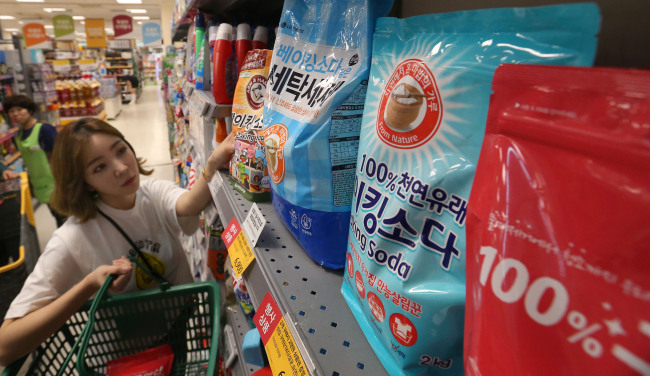Sales of eco-friendly soaps are on the rise as consumers here continue to be wary of potentially harmful household supplies after the Oxy toxic humidifier disinfectant case, data showed Wednesday.
According to data from online open market Auction, sales of natural and eco-friendly dishwashing soaps rose 74 percent in April and May compared to the previous year, reflecting growing demand from retailers and consumers over natural replacements for chemical soaps.
 |
A consumer browses natural cleaners including baking soda at a supermarket. (Yonhap) |
Supermarket chain Lotte Mart said that sales of natural cleaners like baking soda, citric acid, sodium percarbonate and vinegar rose 17.4 percent in May from the previous year, while sales of chemical soaps and disinfectants fell between 14 and 20 percent per category.
Sales of eco-friendly and imported soaps for young children saw even more significant growth, especially since the largest group of victims of toxic humidifier disinfectant made by Oxy Reckitt-Beckinser were pregnant women and young children.
The humidifier sanitizer Oxy Ssak Ssak is blamed for causing 70 deaths and over 100 more injuries in Korea.
According to Auction, eco-friendly soaps for babies and toddlers have risen 120 percent compared to last year.
 |
Models pose with Nellie’s all-natural detergent. (Yonhap) |
Discount retailer E-mart said that sales of Canadian-made Nellie’s laundry detergent, which was popular among new mothers in Korea, nearly doubled its average monthly sales in May despite being nearly double the price of domestic brands.
“Although all-natural cleaners have been becoming more popular due to increased interest in healthy living, the sales increases noticeably spiked after news of the (Oxy) incident broke,” a spokesman for E-mart told the Korea Herald.
According to the spokesman, premium all-natural household brands cost 10 to 20 percent more than regular brands on average.
By Won Ho-jung(
hjwon@heraldcorp.com)









